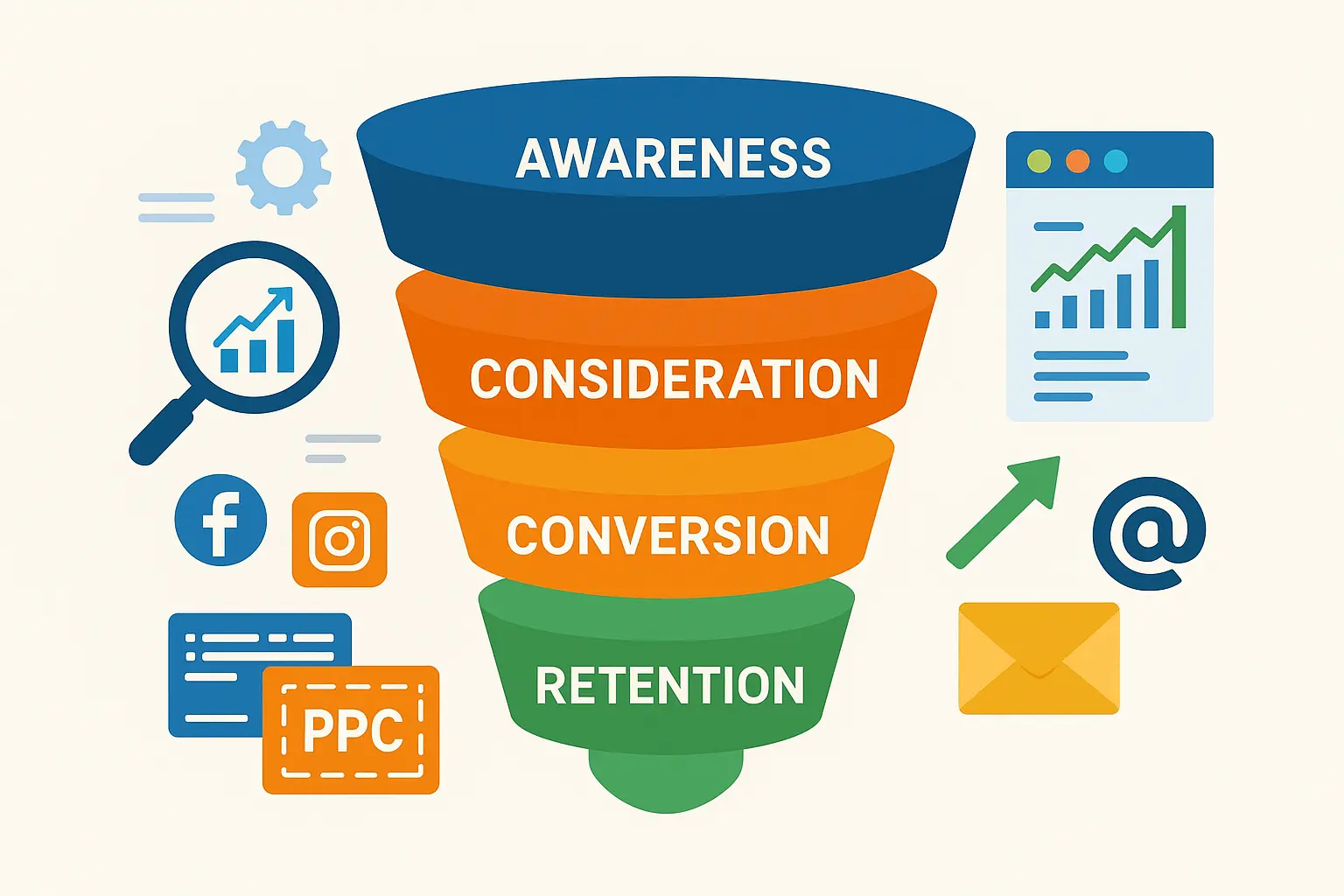In today’s fast-paced digital world, where millions of searches happen every second, keywords are the invisible threads that tie businesses to their audiences. Imagine walking into a library with millions of books but no catalog system—you’d never find what you need. That’s what the internet would look like without keywords.
Keywords help search engines like Google, Bing, and Yahoo understand what your content is about. They also signal to users that your business can solve their problems. Whether you’re a blogger, a small business owner, or a global brand, mastering keywords is crucial for visibility, authority, and sales growth in the digital space.
Why Keywords Matter in Digital Marketing
The Role of Keywords in SEO
SEO (Search Engine Optimization) is the art of making your website show up when users search for something relevant. Keywords tell search engines:
- What your content covers
- Who your target audience is
- How relevant your page is compared to competitors
For instance, if you run a bakery in New York, optimizing for “best cupcakes in New York” will help you show up when hungry locals search for treats nearby.
Keywords in Pay-Per-Click (PPC) Campaigns
In Google Ads or Bing Ads, you don’t just throw money and hope for results. You bid on keywords so your ads show up at the right time. A well-targeted PPC ad for “affordable digital marketing services” can get clicks from business owners actively seeking solutions.
The beauty of PPC is that you only pay when someone clicks your ad. Choosing high-converting keywords can save thousands of dollars while boosting ROI.
Keywords for Content Marketing
Great content without keywords is like a billboard in the desert—nobody sees it. Using the right keywords ensures your content attracts the right audience. For example:
- A blog titled “What Are Keywords in Digital Marketing” attracts beginners researching the topic.
- An ebook called “Advanced SEO Keyword Strategies” appeals to professionals seeking in-depth insights.
By aligning content with keyword intent, businesses can guide potential customers through the entire buying journey.
Different Types of Keywords in Digital Marketing
Short-Tail Keywords
Also called “head keywords,” these are general phrases like “marketing” or “SEO.” While they bring huge search volumes, they’re tough to rank for. Competitors, including big brands, dominate these keywords.
Long-Tail Keywords
These are longer, more specific, and less competitive. For example, “digital marketing services for real estate agents” targets a niche audience. Long-tail keywords may bring less traffic, but that traffic is highly qualified, meaning more conversions.
Branded vs. Non-Branded Keywords
- Branded keywords build brand recognition (e.g., “HubSpot CRM”).
- Non-branded keywords capture new audiences (e.g., “best free CRM software”).
The smartest marketers use a mix of both to retain existing customers and attract new ones.
Transactional, Informational, and Navigational Keywords
- Transactional: Indicate buying intent (e.g., “buy iPhone 14 online”).
- Informational: Indicate learning intent (e.g., “how to optimize website speed”).
- Navigational: Indicate searching for a specific website (e.g., “Amazon Prime login”).
A successful digital strategy balances all three to cover awareness, consideration, and decision-making stages.
How to Find the Right Keywords for Your Business
Keyword Research Tools
Keyword research is the backbone of success. Popular tools include:
- Google Keyword Planner (free, great for PPC planning)
- Ahrefs (best for backlink-driven keyword insights)
- SEMrush (all-in-one competitor and keyword analysis)
- Ubersuggest (budget-friendly for startups)
For example, searching “digital marketing tools” in SEMrush will show search volume, difficulty score, and related keyword suggestions.
Competitor Keyword Analysis
If your competitor ranks for “best social media strategy 2025,” chances are you should too. Tools like SpyFu or Ahrefs let you peek into competitors’ keyword profiles, giving you a roadmap to outperform them.
Understanding Search Intent
Not all searches are created equal. Someone searching “cheap laptops under $500” is closer to purchasing than someone searching “how do laptops work.” Aligning keywords with buyer intent ensures your efforts translate into sales.
Best Practices for Using Keywords Effectively
Keyword Placement in Content
Strategically place keywords in:
- Title tags (for SEO ranking power)
- Meta descriptions (for click-through rate)
- Headings (H1, H2, H3) (for structure)
- Alt text for images (for accessibility and SEO)
- URL slugs (e.g., /digital-marketing-keywords-guide)
Balancing Keyword Density
Over-optimization can backfire. The sweet spot is 1–2% density, meaning keywords appear naturally, without forcing them.
Avoiding Keyword Stuffing
Google’s algorithms are smart enough to spot manipulation. A sentence like “Our digital marketing keywords guide about keywords in digital marketing covers keywords for digital marketing” will hurt, not help. Always focus on human-friendly content.
Advanced Keyword Strategies in Digital Marketing
Semantic Keywords and LSI
Instead of repeating “digital marketing keywords,” add related terms like “SEO phrases,” “search queries,” or “online marketing terms.” This improves rankings and makes content sound natural.
Voice Search Optimization
Voice searches are rising with Alexa, Siri, and Google Assistant. People don’t say “digital marketing keyword tips.” They ask, “What are the best keywords for digital marketing in 2025?” Optimizing for conversational, question-style queries is essential.
Local SEO and Geo-Targeted Keywords
If you own a restaurant in Chicago, ranking for “best Italian food near me” is far more valuable than “best Italian food.” Geo-targeted keywords drive foot traffic and local sales.
Common Mistakes to Avoid with Keywords
Over-Optimization Issues
Focusing only on keywords can make your content robotic. Remember, write for humans first, search engines second.
Ignoring Search Intent
Ranking for high-volume keywords won’t matter if users leave your site because you didn’t meet their intent.
Not Updating Keywords Regularly
Trends shift quickly. A keyword popular in 2020 may not bring traffic in 2025. Regularly refreshing your keyword strategy keeps you relevant.
Future Trends of Keywords in Digital Marketing
AI and Machine Learning Impact on Keywords
Google’s RankBrain and AI-driven algorithms now focus on user experience, context, and relevance rather than just exact-match keywords. This means writing high-quality, intent-driven content is more important than ever.
Zero-Click Searches and Keyword Shifts
Today, nearly 50% of Google searches end without a click because users find answers directly on search pages (via featured snippets, knowledge panels, etc.). Optimizing for featured snippets and FAQ sections is key to staying visible.
FAQs About Keywords in Digital Marketing
Q1: What are keywords in digital marketing?
They’re search terms that connect users with content, guiding SEO, PPC, and content strategies.
Q2: How do I choose the right keyword?
Analyze search volume, competition, and user intent with tools like SEMrush or Google Keyword Planner.
Q3: Should I focus on long-tail or short-tail keywords?
For beginners, long-tail keywords often work better because they’re less competitive and more targeted.
Q4: Can I rank without keywords?
Not effectively. Keywords are still crucial, though content quality and intent alignment matter more than before.
Q5: How often should I refresh my keyword strategy?
At least every quarter (3–6 months) to keep up with evolving search trends.
Q6: Do keywords affect paid ads differently than SEO?
Yes. In SEO, keywords influence organic ranking, while in PPC they directly control ad placement and cost-per-click (CPC).
Conclusion: Mastering Keywords for Digital Success
Keywords remain the lifeblood of digital marketing strategies. They guide everything from organic SEO to paid ads, content marketing, and even voice search optimization. Businesses that understand keyword types, align them with user intent, and apply best practices can unlock sustained growth, traffic, and conversions.
In short: mastering keywords means mastering digital visibility.
🔗 Learn more with Google’s Keyword Planning Guide.


